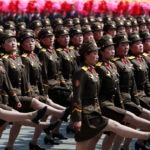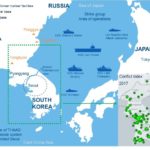Tensions surrounding North Korea nuclear programme continued and US provided support to YPC in Raqqa
April 2017 Update. Tensions continued between North Korea and US over the nuclear test programme and the US increased its missile defence system in the area. The Chinese will continue to maintain the statuo quo while the tone of the US escalated but softened thereafter. In the Middle East, the advances of the coalition forces continue and the the ISIS situation deteriorates. The US decided to advance in Raqqa (the ISIS capital) supporting the YPG forces in the combats. Turkey has already protested the decision. Social unrest increased in some Latin American countries, while Asia remained calm. Uncertainties about the future of Europe decreased after Macron’s victory in French elections.
For more information, please visit BBVA Research’s website

Key messages:
- The BBVA Research World Conflict Intensity Index increased during April: Diverging from its long-term average (1980-2015).
- North Korea’s nuclear weapons programme and tensions with the US continued to be of concern: The US started to install a missile defence system on the Korean peninsula and is expected to tighten economic sanctions against North Korea.
- US support the Kurdish YPG to advance on Raqqa: The US finally decided to provide military support to the Kurdish YPG to seize Raqqa (ISIS capital). Turkey shows its discontent after the decision.
- Conflict between Russia and Ukraine remained contained, although political tensions increased: The heads of state of Russia, Ukraine, Germany and France met to renew their commitment to the Minsk 2.0 peace agreement.
The BBVA Research World Conflict Intensity Index[1] increased during April. The main developments during the month were:
- Following the US strike in southern Idlib (Syria) at the beginning of the month, made in response to the Bashar al-Assad regime’s use of chemical weapons, the US dropped the largest non-nuclear bomb in combat, targeting an ISIS tunnel infrastructure showing a tougher stance. The attack was part of the new US officials’ offensive strategy in the Middle East against ISIS. Russia, Iran and Syria expressed their concern regarding the US action and its expanded deployments to the Syrian-Jordanian border. Turkey conducted air raids against PKK/YPG positions in Syria & Iraq. Finally, the US decided to support the Kurdish YPG in the seizing of Raqqa (the ISIS capital in Siria). The decision was not welcomed in Turkey, as they considered the Kurdish YPG as an affiliate of the terrorists of the PKK. ISIS conducted several attacks in Iraq in order to set conditions to exploit security vulnerabilities during Ramadan, which this year begins at the end of May.
- In Eastern Europe, Ukrainian conflict stabilised after the Russian, Ukrainian, German and French heads of state spoke to renew their commitment to the Minsk 2.0 peace agreement. Instability in the Caucasus eased off, while rose in Macedonia given political tensions after Parliament riot. Kosovo’s stability is also at risk.
· Tensions in the China Sea increased slightly and remained of concern in North Korea, since Kim Jong-un continues to challenge the main powers with ballistic missile and nuclear weapons tests and after both North Korea and the US regional allies conducted military exercises in the border regions. The US deployed warships and a submarine in Korea, activating a missile defence system. Moreover, the Trump administration is expected to tighten economic sanctions against North Korea, while China opts for a diplomatic solution.

The military build-up in the Korean peninsula and BBVA Research conflict intensity index. - BBVA Research and www.gdelt.org
The BBVA Research World Conflict Intensity Index[1] increased during April. The main developments during the month were:
- Following the US strike in southern Idlib (Syria) at the beginning of the month, made in response to the Bashar al-Assad regime’s use of chemical weapons, the US dropped the largest non-nuclear bomb in combat, targeting an ISIS tunnel infrastructure showing a tougher stance. The attack was part of the new US officials’ offensive strategy in the Middle East against ISIS. Russia, Iran and Syria expressed their concern regarding the US action and its expanded deployments to the Syrian-Jordanian border. Turkey conducted air raids against PKK/YPG positions in Syria & Iraq. Finally, the US decided to support the Kurdish YPG in the seizing of Raqqa (the ISIS capital in Siria). The decision was not welcomed in Turkey, as they considered the Kurdish YPG as an affiliate of the terrorists of the PKK. ISIS conducted several attacks in Iraq in order to set conditions to exploit security vulnerabilities during Ramadan, which this year begins at the end of May.
- In Eastern Europe, Ukrainian conflict stabilised after the Russian, Ukrainian, German and French heads of state spoke to renew their commitment to the Minsk 2.0 peace agreement. Instability in the Caucasus eased off, while rose in Macedonia given political tensions after Parliament riot. Kosovo’s stability is also at risk.
· Tensions in the China Sea increased slightly and remained of concern in North Korea, since Kim Jong-un continues to challenge the main powers with ballistic missile and nuclear weapons tests and after both North Korea and the US regional allies conducted military exercises in the border regions. The US deployed warships and a submarine in Korea, activating a missile defence system. Moreover, the Trump administration is expected to tighten economic sanctions against North Korea, while China opts for a diplomatic solution.
Summary
The US intervention in the Middle East intensified once again during the month. The size of Raqqa could be inminent once the US has decided officially to support Syrian Kurds, angering Turkey. North Korean tensionsshould be closely monitored in the coming months. Macron’s victory in the French elections has reduced uncertainty and boosted confidence over the future of the European Union.
[1]: Details about methodology can be found in the following link: Methodology, tracking protests and conflicts.